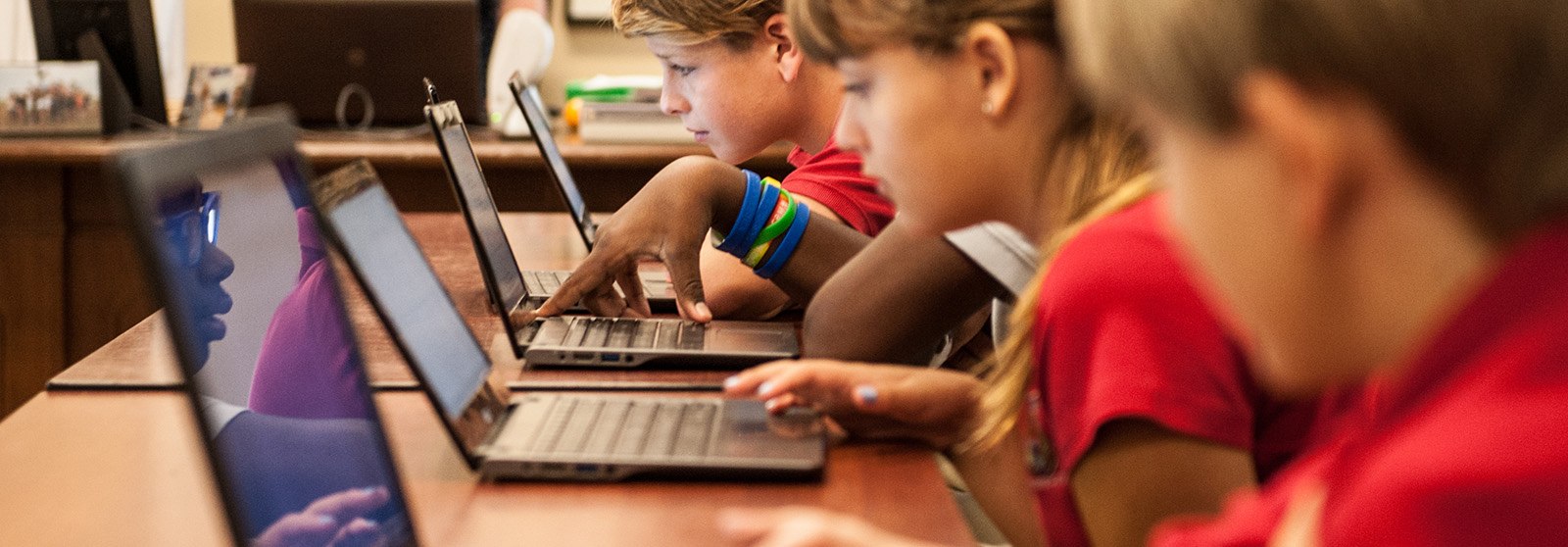Technology Usage Policy
Use of technology at The Geneva School is designed to dignify all persons, aid in the cultivation of community, and help to reach curricular goals. Technology use is not a private matter, but a public and community one. Technology use must be in keeping with the school’s mission, vision, and values, and biblical ethical standards.
STUDENT ACCOUNTS, DEVICES, AND NETWORK
Google Apps for Education is used by students in 7th–12th grade to encourage student and faculty communication and collaboration.
Students in 7th and 8th grade are given a Google Apps for Education account and are expected to have access to a computer with internet capabilities and a printer at home. They are not required or allowed to bring a device to school since a school-provided and managed Chromebook will be used in 7th and 8th grade classes when needed for classroom assignments.
Students in 9th–12th grade are given a Google Apps for Education account. For general classroom use, students in 9th–12th grade may bring a device to school if they wish but are not required to do so. Please note that 9th–12th grade students in some rhetoric elective classes are required to bring a Windows or Mac laptop. In addition, students should have access to the internet and a printer at home.
The school uses a filter to limit exposure to inappropriate internet content, but is not able to guarantee that a student will never be able to access inappropriate internet content, particularly if that student makes intentional, determined, and sustained attempts to do so.
In order to ensure that computers and the internet are used in a proper manner, the administration and staff have the authority to monitor all aspects of computer usage which occurs within the school facility.
DIGITAL ETIQUETTE
Acceptable Uses:
- Conducting research
- Participating in collaborative projects
- Creating beautiful, informative works
- Encouraging and strengthening friendships and community
Unacceptable Uses:
- Public posting of any student’s name, personal address, or phone number
- Sending or displaying offensive messages or pictures
- Using obscene language
- Bullying or other unloving actions or words directed toward others
- Damaging computers, computer systems, or network systems
- Trespassing in another’s folders or files
- Using someone else’s password
- Attempting to disrupt community networks
- Agreeing to meet someone met online without parental approval and under the supervision of an authorized adult
- Plagiarizing information found on the Internet
- Recording of another person, whether video or audio, without their knowledge or permission
- Using school accounts in any way that is not related to school projects or purposes
SOCIAL MEDIA POLICY
- Faculty and staff interacting with grammar school students via any electronic communication should include one or both parents of the student.
- Faculty and staff interacting with upper school students via any electronic communication should include a copy to one or both parents whenever possible. In rare situations where copying parents is less preferable, another faculty or staff member must be copied instead of a parent.
- Faculty and staff interacting with upper school students in an extracurricular setting via any electronic communication should always include a copy to another faculty or staff member.
- Students who send text messages or emails to faculty or staff should always copy a parent, so that faculty and staff may more easily include a parent when replying.
- In “traditional” social media, when making or receiving a “friend” request with a student, employees must communicate with at least one of the student’s parents, requesting permission.
- Students and faculty are asked to restrict the hours for telephone calls to 3–6 pm Monday through Friday.
CELL PHONES AND OTHER ELECTRONICS
- Lower school students are not permitted to bring cell phones to school.
- Dialectic and rhetoric students who bring cell phones to school are not permitted to use them during regular school hours upon entering the building in the morning until the last bell, including lunch time. Cell phones should be turned off and stowed either in a student locker or backpack during school hours except as noted below.
- Earbuds are permissible for dialectic and rhetoric students ONLY while quietly working/studying during a study hall period (with the permission of the teacher) or while quietly working/studying in a classroom after school. Otherwise, earbuds are not allowed.
- Smart watches are not allowed to be worn by students during school hours as these devices can also be used for texting and accessing media.
- Parents should refrain from calling their students on their cell phone during school hours.
- Students are permitted to use other devices at the discretion of a teacher in a class situation. Otherwise, all electronic devices must also be stowed in the student’s locker or backpack.
- Students may use recording devices in specific classes with the permission of the teacher.
- Electronic devices or cell phones that are not properly stowed will be confiscated by the teacher or staff member who discovers it, given to the grade-level director and returned only to a parent or guardian who comes to claim it. Upper School Only: If a parent is unable to come to the school to claim the phone, the student may claim it at the end of the day but will receive an additional two demerits.
- Students are not permitted to take electronic devices (other than cameras) on field trips. Cell phones are only permitted in special cases deemed necessary by the grade-level director.
- Continued violation of these rules may result in the permanent confiscation of the device or equipment.
- Any exceptions to these policies must be approved by the grade-level director.


